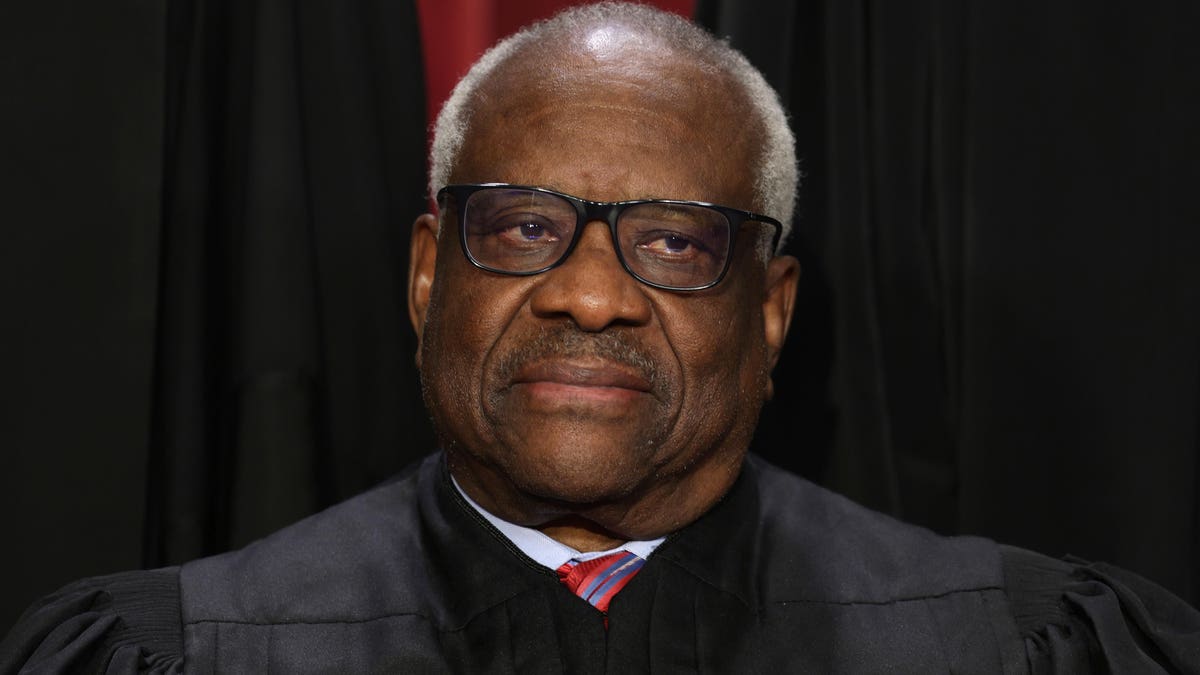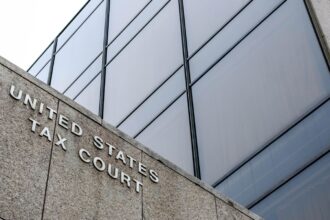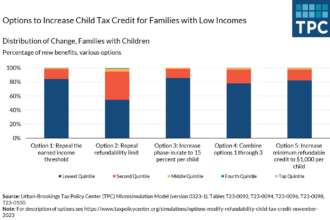Professors Bridget Crawford and Victoria Haneman discuss the estate and gift tax and how it could apply to the gifts received by Supreme Court Justice Clarence Thomas.
This transcript has been edited for length and clarity.
David D. Stewart: Welcome to the podcast. I’m David Stewart, editor in chief of Tax Notes Today International. This week: tax, the greatest gift of all.
The taxation of gifts has found its way into the news of late with reports of lavish travel provided to Supreme Court Justice Clarence Thomas. Now, there are many outstanding questions on this, but tax is kind of our thing.
So to learn more about the gift tax and how it relates to Justice Thomas, we’re joined by Bridget Crawford, a university distinguished professor and professor of law at Pace University, and Victoria Haneman, the Frank J. Kellegher Professor of Trusts and Estates at Creighton University School of Law.
Victoria, Bridget, welcome to the podcast.
Victoria Haneman: Thank you for having me.
Bridget Crawford: Thank you.
David D. Stewart: All right, why don’t we start off with the basics of the gift tax. What is it and how does it work?
Victoria Haneman: The gift tax from a 30,000-foot aerial view: I would say the estate tax has been in the code since 1916. The gift tax came in later in 1924. It is probably a bit reductionist but fair to say that the purpose of the gift tax is to prevent taxpayers from avoiding the estate tax by giving away all of their money five minutes before their death. The gift tax is a tax that is owed by a donor, or the giver of a gift, and the taxpayer, the donor, must report any gift over $17,000 in a calendar year per donee or $34,000 per year if they’re married and gift splitting, that’s as of 2023.
If gifts are made in excess of that amount, it does not automatically trigger the gift tax, but the taxpayer has to file a Form 709 and report the amount of the gift. The amount of those gifts given by the taxpayer [is] tracked on all of those Form 709s and applied against the lifetime exemption amount.
In 2023, the IRS will allow a taxpayer to gift $12.92 million in assets before the tax is triggered.
I should note that very few people actually pay the gift tax. In 2020, according to SOI [Statistics of Income] tax stats, there were only 173,000 nontaxable returns filed, and usually less than 1,000 taxable returns filed under the present rules.
David D. Stewart: Now, I guess the question is if it’s on the donor to file these taxes and we’re not seeing a lot of these tax filings, is that just people not complying with the gift tax, or is it that there aren’t that many gifts that trigger it?
Victoria Haneman: I’m sure that there’s a certain amount of noncompliance in every tax system, but in this case I believe it’s because of the exemptions and the exclusions that are in place. Not many gifts are going to trigger gift tax liability under current limits and rules.
David D. Stewart: What does and doesn’t count as a gift under the gift tax rules?
Bridget Crawford: This is something that we talk about all the time with our students. Gift tax applies to transfers of property by gift. A transfer of property by gift.
What is a transfer of property? Well, the use of property is treated as property, so the ability to use property is the same. And that we see in a very important Supreme Court case, the Dickman case, where mother and father loaned money to their child, interest free, and the Supreme Court said, “Look, use of that money is a property interest, and that’s going to be subject to tax.” So we’re looking for transfers of property by gift.
David D. Stewart: All right. Turning to the issue that has been in the news lately, we’ve seen a lot of reporting about very large gifts being given to Supreme Court Justice Clarence Thomas by billionaire donor Harlan Crow. Could you tell us about the gifts that we’ve heard about and where they might fall into this issue?
Victoria Haneman: We’ve heard about quite a bit of luxury travel, we’ve heard about private school tuition for a nephew, we have heard about the purchase of a house from Thomas with his mom being allowed to live there free for life.
Professor Crawford and I have really focused upon the luxury travel component and the hospitality that was enjoyed by Clarence Thomas provided by his alleged billionaire friend Harlan Crow.
David D. Stewart: Is there something different about bringing someone along with you on a trip that makes it less of a gift, or is this squarely in the area that would be covered by the gift tax?
Victoria Haneman: Let me frame this out by presenting two different factual scenarios.
If I buy my friend a first-class $50,000 plane ticket, it’s a gift, right? I would arguably report $33,000 or the amount that exceeds the $17,000 annual exclusion. So we have a $33,000 reported gift.
If I allow my friend to use my yacht or private jet, it’s different from buying a commercial airline ticket. I think that professor Crawford and I are really digging into why and how it’s different. As long as they’re traveling with me on the jet or the yacht, there is no additional cost for them to be on the yacht or the private jet. I’m going to be using my plane whether they’re there or not.
This is where we really have the debate about whether or not the transfer should be taxable. I mean, as a matter of policy, if we’re not treating these two situations alike, we need to think about why. Do we want to incentivize travel by yacht or private jet? Do we not want to be bothered tracking the use of cellphoned assets? Do we just accept that billionaires will have larger and more expensive cellphoned assets? We know that staying at someone’s house is not a taxable gift, but what if the person is wealthy and buys a resort and allows you to stay at the resort for free for six months?
These are really the issues that we are digging into.
David D. Stewart: OK, so how do we sort things out in this case? We have luxury travel on a very fancy yacht where he’s with them. How do we assess the value if they’re both traveling at the same time?
Victoria Haneman: I can tell you that in the context of the income tax, when there is the personal use of a private jet that is otherwise being used for business travel, we have no problem with assessing the cost of the personal use.
In other words, if a CEO is traveling on a private jet that is paid for by his company and he brings his child along and the child is not employed with the business, we have no problem taxing the CEO for the value of the child’s flight on the private jet or requiring that the CEO reimburse the company for the cost of the child’s flight on the private jet.
There’s a formula that we use that basically approximates the value of the cost of a first-class airline ticket. So valuing this type of luxury travel is done in other contexts, specifically the context of the income tax code. It is something that could be done for gift tax purposes, it just presently is not.
David D. Stewart: I understand that under the gift tax there is the reporting obligation on the part of the donor. Is there any obligation for Thomas to be reporting these gifts as things that he’s received?
Victoria Haneman: The gift tax falls upon the donor and the obligation to report the gift falls upon the donor. And so there is no obligation from a tax perspective for Clarence Thomas to disclose to the IRS that he has been receiving gifts from Harlan Crow.
David D. Stewart: Now, how do we distinguish between whether it was a gift or should have been recorded as income? Because that seems to change the reporting requirement for who needs to inform the IRS of the transfer of money.
Bridget Crawford: The gift tax analysis is completely different than the income tax analysis. From an income tax perspective, the test for whether someone has made a gift has to do with their subjective intent in making the transfer. But in any case, Clarence Thomas would have no income under section 102. That’s a completely separate analysis from the gift tax analysis, which is merely interested in a comparative analysis, what was transferred by Mr. Crow versus what was received in return. And we certainly expect that Thomas did not pay for these trips.
David D. Stewart: All right. You mentioned a precedential case, Dickman v. [Commissioner]. Does that apply in any way? Is there any analysis to be gleaned from that in this case?
Bridget Crawford: Dickman is the important case here because we know from Dickman that the use of property is a property interest subject to the gift tax. What the court did say in Dickman was that it need not respond to the slippery slope argument.
The taxpayer in that case was making the argument that the IRS is seeking to elevate to the status of a tax law gift a commonplace transaction, like a loan of a proverbial cup of sugar to a neighbor or a loan of lunch money to a colleague. And the court said when and if the time comes, we can decide that case when we get to it.
In other words, routine neighborly and routine familial gifts are, generally speaking, low enough value and outside the scope of the gift tax. We simply don’t have that in this case. Uttering the words, “We are good friends,” does not suddenly convert every transfer from Mr. Crow to Justice Thomas and Justice Thomas’s wife into a no-tax zone.
David D. Stewart: Are there any other complicating factors in this case? We have a party that has an interest in what goes on at the Supreme Court giving these lavish gifts. Does that raise any additional issues of what might or might not be taxable?
Victoria Haneman: It’s interesting because when discussion comes up in the context of Clarence Thomas, because the country’s so politicized right now, a lot of people almost become emotionally flooded. I think the focus is really on the tax side of this, and Thomas and his interactions with Harlan Crow are casting a spotlight on an issue that we’ve not spent a lot of time considering, but an issue that we know needs to exist out there in a larger context beyond just a Supreme Court justice.
David D. Stewart: All right. Let’s turn to the question of what is to be done here. Are there any discussions of potential changes to the way gift taxes are implemented?
Victoria Haneman: I think that as far as where we stand today, Biden has floated a number of legislative proposals since he has been president. Legislative proposals specific to the estate and gift tax. We know that we have a green book proposal that will impose an annual limit of $50,000 per donor on gifts, indexed for inflation on a specific category of gifts. It would limit the amounts that qualify for the $17,000 per donee annual exclusion.
That is something that is out there right now. I don’t know that it directly bears upon gifts of luxury travel except that we’re talking about proposals to curtail the amount that can pass every year.
We have Senator Wyden from Oregon who said that Harlan Crow is refusing to respond to questions about his gifts and hospitality to Clarence Thomas. And in doing so, he’s relying on the argument that the Finance Committee lacks a legislative basis for investigating abusive gift taxes by the wealthy.
I think that the fact that Senator Wyden and the Finance Committee is involved speaks to the fact that this issue is going to receive attention. As far as whether or not the attention will result in legislation, I think that’s an entirely separate issue.
David D. Stewart: All right. If you were going to try to fix this system, what sort of changes could be made to improve on the current gift tax?
Bridget Crawford: Well, I think at a minimum we need some regulatory guidance here about whether gifts of luxury travel are subject to gift tax.
Of course, Congress could take the position that luxury travel is not taxable, it’s always taxable. We think there’s a strong case to be made for a very minor exception, akin to the no-additional-cost services under income tax laws when there’s truly excess capacity, such as when I allow my friend to come along on my private jet and it costs nothing else for them to occupy the empty seat. We think there could be a possible limited exception, but in any case, the need for regulatory guidance is clear.
David D. Stewart: All right, Bridget, Victoria, thank you so much for being here. This has been a great discussion.
Victoria Haneman: Thank you for having us.
Bridget Crawford: Thank you.
Read the full article here









